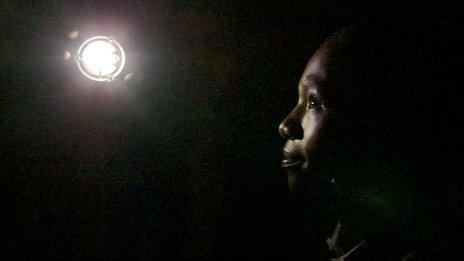Africa debate: Can Africa lead the way on renewable energy?
- Published
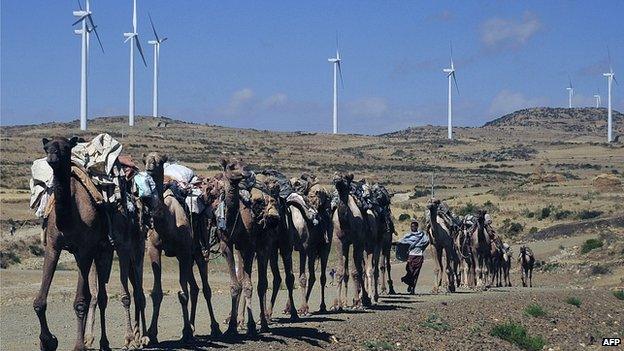
There are a lot of sources of renewable energy like strong winds in many parts of Africa
There is a popular joke doing the rounds in Cape Town at the moment.
Question: What did South Africa use before candles? Answer: Electricity.
For people living here, it is not that funny.
The country is undergoing its worst power crisis since 2008, with a rolling schedule of power cuts reintroduced in November as Eskom, the national electricity provider, struggles to meet demand.
In a report published on World Environment Day, the Africa Progress Panel makes the case for Africa to emerge as a "global renewable energy superpower". So could this be the solution to Africa's power trouble?
Energy poverty
Policy-makers have big decisions to make ahead of another round of United Nations climate change talks in December.
They are faced with the challenge of juggling the competing demands of meeting energy demands now, while supporting low carbon development for the future.
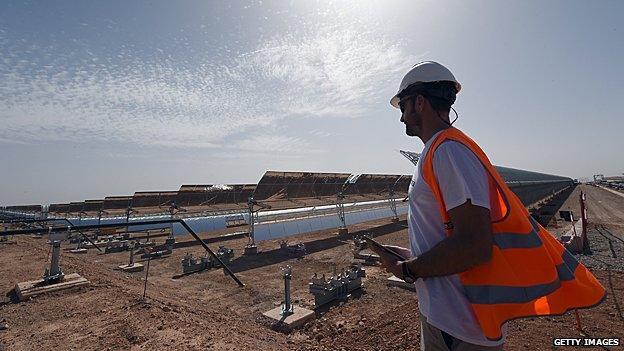
Large solar farms are being built, but small-scaled ones can also go into the energy mix
South Africa has one of the largest and most developed economies on the continent, but it risks being held back by insufficient energy provision.
Other major economies grappling with power crises include Nigeria - which produces more than 2.5 million barrels of oil a day, yet many of its citizens live without electricity. Big cities like Lagos are a whir of generators; the country boasts the highest concentration of small-scale generators in the world.
Across Africa as a whole, 600 million people - two-thirds of the population - do not have access to electricity.
One of the draft Sustainable Development Goals, which will replace the Millennium Development Goals this year, is for universal access to electricity by 2030.
Experts say that on current trends it will take Africa until 2080 to achieve this goal.
Whilst this so-called "energy poverty" is an issue in countries across Africa, so too is climate change and its impacts. As the chairperson of the Africa Progress Panel Kofi Annan points out: "No region has done less to contribute to the climate crisis, but no region will pay a higher price for failure to tackle it."
'Leap frog' effect
But it is not all bad news.
"African governments have an opportunity to seize the climate challenge to rethink their energy policies," according to APP executive director Caroline Kende-Robb.
As the APP report argues: "No region has more abundant or less utilized renewable energy potential. Decentralized power generation and distribution systems are opening up new possibilities for reaching populations currently bypassed by national grids."
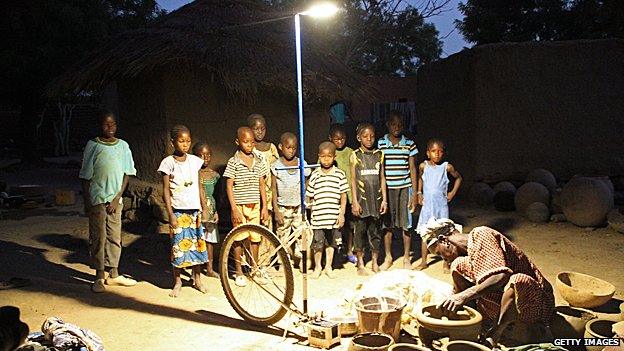
Small, portable units like this solar-powered street light in Mali can make major changes to a community
An analogy can be made with the spread of mobile telephones.
Greg Austin, managing director of juwi Renewable Energies, says: "Mobile phones are more efficient and better geared towards a modern economy [than fixed lines]. The same is true of power - the consumption of electricity can be more closely linked with generation."
That means that the role of a national grid may be reduced, with more power produced and consumed on local systems using solar or wind energy, which may be cheaper and easier to manage.
Faster progress
The APP report is measured, advocating renewable forms of energy such as wind, solar and hydro-power as part of the mix, but not overlooking the necessity of the continued use of fossil fuels in Africa in the short to medium term.
"Every government has to determine what constitutes a judicious mix of energy sources... But no government can afford to ignore the emerging opportunities associated with low-carbon technologies."
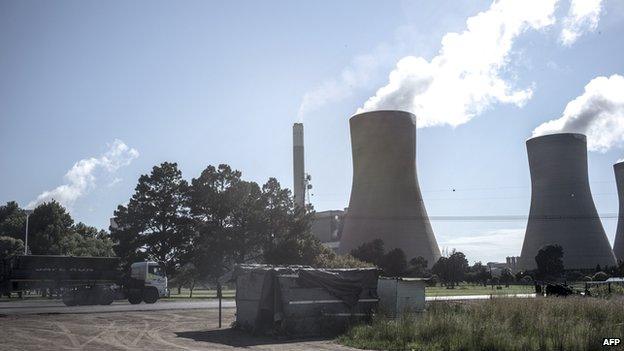
South Africa still relies on coal to supply most of its energy needs
But some green energy campaigners say Africa has been too slow in embracing new technologies.
Muna Lakhani is the Cape Town coordinator of Earthlife Africa, one of the oldest environmental justice organisations on the continent. He dismisses some of the arguments against renewable energy, including the cost, as outdated.
"These are the kind of myths propagated in the media by people with vested interests in the power industry," he says.
The cost of wind energy in South Africa is going down as technologies improve, whilst the cost of coal is increasing as supplies dwindle.
He also dismisses the idea that renewable energy sources are less predictable than fossil fuels: "We don't advocate a single technology, but rather a mix of solar, wind and ocean current energy in South Africa.
"With this mix, renewable energy can be highly predictable; if you know what is happening, you can balance supply."
He sees a future where renewable energy sources can provide most of the power supply for Africa, and insists that that future need not be that far away.
- Published27 January 2015
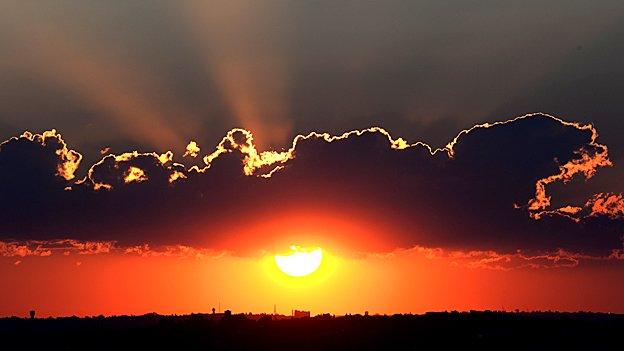
- Published25 February 2013
